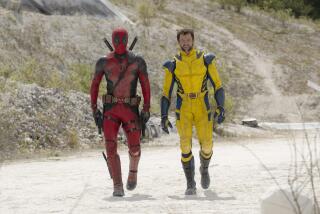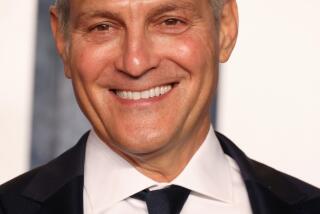Ike Perlmutter holds the reins of superheroes at Marvel
- Share via
Walt Disney Co.’s acquisition of Marvel Entertainment gave it the Hulk, Iron Man and other superheroes to fuel summer blockbusters for years to come.
It also got Ike Perlmutter.
Marvel’s chief executive is hardly a household name. But Disney’s purchase of the comic book publisher made Perlmutter one of the largest individual shareholders in the entertainment conglomerate, giving him special powers all his own.
Superheroes are big business in Hollywood, accounting for three of the top-grossing films in the U.S. this year: Marvel’s”The Avengers,””The Dark Knight Rises” and”The Amazing Spider-Man.”At a time when other expensive movie gambles such as”John Carter”and”Battleship”bombed, Disney’s decision to pay $4 billion for Marvel in 2009 seems inspired.
“The Avengers” was Disney’s biggest hit of the year, reaping $1.5 billion in worldwide box-office revenue. That came on the heels of last year’s Marvel movies:”Thor”and”Captain America: The First Avenger”— which together brought in more than $800 million globally.
And there’s more to come, starting with “Iron Man 3” in May and followed by new sequels to “Thor,” “Captain America” and “The Avengers.”
“Disney, Pixar and Marvel have the incredible characters and compelling stories that people connect to — the kind we’ve proven we can build strong, long-lasting franchises upon,” Disney Chief ExecutiveRobert A. Iger said during a recent conference call with Wall Street analysts.
With great box-office strength comes great influence. Although he does not hold a board seat, Perlmutter is in regular contact with Iger and has played a role in executive changes at Disney Consumer Products, according to Disney insiders who were not authorized to speak publicly.
Perlmutter did not respond to requests for comment, nor did Disney or Marvel officials.
But according to people inside the Burbank conglomerate, Perlmutter backed a shake-up in the consumer products group that led to the film studio’s distribution head, Bob Chapek, replacing retail veteran Andy Mooney. Mooney and Perlmutter were said to have clashed over the approach to merchandising Marvel characters. The change cleared the way for the Marvel executive to inject the Disney’s merchandise licensing group with his cost-cutting sensibilities.
People who know the 69-year-old Israeli emigre are not surprised to find him taking a hands-on role at Disney, maintaining regular contact by phone.
“This guy’s whole life is dedicated to being a success,” said former Marvel CEO Scott M. Sassa, who is now president of Hearst Entertainment & Syndication. Sassa said Perlmutter has shown himself especially adept at turning around troubled companies, including Remington and Marvel.
“He’s not Mr. Charming, but once you get to know him, he’s a guy that I really like a lot,” Sassa said. “He’s super smart, incredibly loyal to people and highly principled.”
By all accounts, Perlmutter has an eye for recognizing value in businesses that others deemed worthless, and exercises a frugality that has become the stuff of lore. Former executives say Perlmutter would retrieve paper clips from the trash and tear up old memos to create new notepads. One college intern called home to report that Marvel refused to turn on the air conditioning during one sweltering New York heat wave, according to a one person with knowledge of the incident who declined to be named because of the person’s relationship with the company.
The bottom-line focus has extended to the New York-based Marvel’s foray into Hollywood.
The upstart Marvel Studios quickly earned a reputation for keeping a lid on costs, seeking out filmmakers and stars who were hungry for a comeback and willing to work for relatively modest rates. Director Jon Favreau was still feeling the sting of “Zathura” when he signed on for his career-changing “Iron Man,”while Joe Johnston was fleeing the grisly failure of”The Wolfman” when Marvel handed him the shield of “Captain America: The First Avenger.” ReboundingRobert Downey Jr. wasn’t even the highest-paid star in “Iron Man.” That was Terrence Howard.
Perlmutter personally oversaw marketing costs for “Iron Man” and other Marvel films, scrutinizing every cent spent on vendors and promotions and bringing an uncommon vigilance to expenses, say people familiar with the matter who were not authorized to speak publicly. And agents consider Marvel one of the toughest places to make a deal for talent.
Perlmutter’s power and influence at Disney are all the more amazing given his background.
Isaac “Ike” Perlmutter arrived in New York at age 24 with $250 in his pocket and dreams of making his fortune, according to longtime friend and former Marvel board Chairman Morton E. Handel. Now, Perlmutter has a net worth that Forbes magazine estimated at $1.9 billion, ranking him among the 500 wealthiest Americans. He splits his time between a $3.2-million Palm Beach, Fla., condominium and a Manhattan apartment near the East River.
Perlmutter served in the Israeli army during the Six-Day War of 1967, according to Dan Raviv’s “Comic Wars: Marvel’s Battle for Survival,” and is intensely private and concerned about his security. As recently as 2006 he held a concealed weapon permit in Florida. He attended the 2008 “Iron Man” premiere at Grauman’s Chinese Theatre wearing a mustache and wig to avoid being recognized by photographers. Raviv describes the avid tennis player as lanky and fit, with a full head of salt-and-pepper hair.
“He is the Hollywood antithesis,” Handel said. “He doesn’t go to movies to any appreciable degree.”
His thriftiness and shrewdness were evident from his earliest business ventures. Raviv’s book describes how Perlmutter would wait outside the entrance of Jewish cemeteries in Brooklyn, wearing a yarmulke on his head and offering, for a fee, to recite the Kaddish prayer for the dead.
With a loan from his in-laws, Perlmutter started Odd Lot Trading in the late 1970s, a company that purchased closeout soap, beauty products and toys that he resold at dollar stores. He sold the company in May 1984 to drugstore chain operator Revco D.S. Inc. Once inside Revco, he began agitating for change, alleging improprieties by top management and threatening a hostile takeover, according to the book “The Vulture Investors.” Ultimately, he accepted $120 million in payments to give up his stock and leave the company.
Coleco Inc., the struggling maker of Cabbage Patch dolls, was the next company to attract Perlmutter’s interest. He had been in business with the toy maker for years, trading advertising credits for unsold toys. As Coleco teetered on the brink of bankruptcy, Perlmutter and a business partner bought $90 million worth of debt for $50 million, according to “The Vulture Investors.” After a lengthy battle among creditors, Coleco’s assets were sold to rivalHasbro Inc.and other buyers for a total of $150 million. Perlmutter walked away with a $70-million windfall.
Perlmutter played a similar role at struggling electric shaver company Remington. Perlmutter took a 50% stake for $25 million, brought in new management, dramatically cut costs, then sold his stake for a $200-million profit.
“He’s unafraid. He doesn’t care about public sentiment or what people think about him,” Sassa said. “He cares about what makes most sense to him.”
His crowning achievement is Marvel, which he acquired out of bankruptcy by out-maneuvering financiers Ron Perelman and Carl Icahn.
Under Perlmutter, Marvel reinvented itself. Comic books became, in effect, Marvel’s research and development arm, developing characters and story lines that could be exploited through film, TV and video games. Licensing deals with 20th Century Fox and Sony Pictures revealed that Marvel characters such as the X-Men andSpider-Man could transcend comic books and connect with mainstream audiences.
Former Marvel Studios Chairman David Maisel said Perlmutter supported a pivotal decision — for Marvel to launch its own studio. Maisel argued, in presentations to the board, that this approach would afford greater creative control over films featuring its characters, and potentially greater financial rewards, and also give Marvel power over scheduling, so toys and video games could be released to coincide with a movie’s premiere.
“Ike was incredibly supportive of my desire and goals to build Marvel’s own studio, when many, many other people had serious questions of whether that was the right strategy,” Maisel said.
The choice was anything but an obvious — or safe — one.
“Now we look back and it all looks so perfect,” said former Marvel CEO F. Peter Cuneo. “But there were lots of ups and down along the way, and lots of legitimate differences of opinion.”
Times staff writers Geoff Boucher and John Horn contributed to this report.
More to Read
From the Oscars to the Emmys.
Get the Envelope newsletter for exclusive awards season coverage, behind-the-scenes stories from the Envelope podcast and columnist Glenn Whipp’s must-read analysis.
You may occasionally receive promotional content from the Los Angeles Times.










